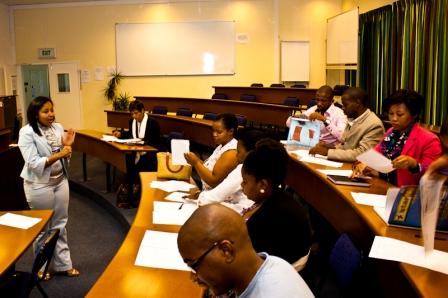
Providing quality Business Analysts and meeting the increasing demand for business modelling in South Africa are the main objectives of the recently launched Work Readiness Programme (WRP) which is being facilitated by Rhodes Business School.
The first of its kind in South Africa, this particular WRP offers a practical, multi-faceted approach to the development of crucial business skills and is specifically targeted at 96 unemployed commerce, information systems or computer science graduates who aspire to become business analysts.
According to Professor Owen Skae, Director of Rhodes Business School, South Africa has a critical shortage of Business Analysts, many of whom have been in-sourced from other countries to meet the need.
While this contributes to a global perspective, Prof Skae said, it also raises questions about the transfer of skills, developing local knowledge, job creation and outflow of foreign exchange.
Rhodes Business School’s newly launched Certificate in Sustainable Business Modelling forms a crucial component of the WRP, which was jointly conceived by Prof Skae and old Rhodian and leading global expert in Business Modelling, Mr Cedric Tyler, who is a Visiting Fellow at Rhodes Business School.
Mr Tyler is also the founder of US-based Business Genetics Incorporated, whose Business Modelling methodology and software tool forms the basis of the programme. Rhodes Business School will take overall responsibility for the delivery and implementation of the WRP, which will entail planning and delivery of teaching and learning interventions.
The LAC will assist the School in Host Employer placements and providing administrative and logistic support, learner support and workplace simulations so as to maximize the chances of learner success in passing the certificate.
The WRP involves teaching six modules simultaneously in four centres around South Africa, between May and August 2012, including Johannesburg/Pretoria, Cape Town, Durban, Port Elizabeth/Grahamstown.
In between modules, the learners are placed in Host Employers and undertake work based assignments. “It therefore becomes a very much ‘learning by doing’ programme, whilst at the same time ensuring that the requirements of the Certificate expose the participants to the latest thinking, methods and software applications,” Prof Skae said.
“Through the partnership between ourselves, Business Genetics and the Learning Alliance Consortium, we have a formidable team that provides the best environment for the learners to succeed on this journey. We are proud to be part of an initiative, which has responded directly to President Zuma's call for programmes to create jobs,” Prof Skae said.
According to Mrs Adele Korff, Senior Specialist at Deloitte Consulting, this is the first time the company is approaching a WRP in this way.
“We are very excited about this and are doing our best to make it work. Research shows there is a big shortage of business analysts in South Africa so it is critical that we get the project working so it can address these needs,” said Mrs Korff.
She added that numerous South African banks are looking into embarking on similar training courses for business analysts.
Funded by the Sector of Education and Training Authority for Finance, Accounting, Management Consulting and Other Financial Services (FASSET), the contract was awarded by FASSET on the basis of a joint bid submitted by Rhodes Business School and the Learning Alliance Consortium (LAC).
The LAC, comprising Deloitte Consulting (Pty) Ltd, Duja Consulting (Pty) Ltd and Sonke Skills Solutions (Pty) Ltd was established in 2006 with the purpose of addressing the needs of industry bodies that intended to embark on large scale national skills development initiatives.
Written By Sarah-Jane Bradfield
Picture By Adrian Frost
